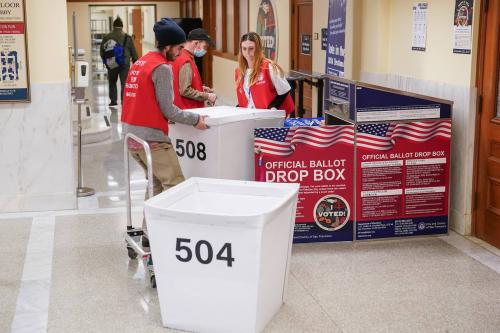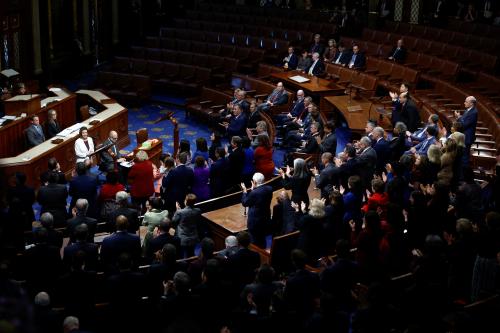Editor’s Note: The following are Ted Gayer’s comments at a conference hosted by the Chamber of Commerce Foundation on July 8, 2010 on “Contemporary Conservatism and Government Regulation,” in response to a paper presented by Christopher DeMuth of the American Enterprise Institute. DeMuth’s paper analyzes how conservatives have opposed the growth of government regulation in principle, but how they have accommodated that growth in practice.
Thank you for the invitation to speak here today. Chris probably doesn’t remember our first meeting. I can’t remember exactly what we discussed, but I do remember apologizing to him for presenting some half-baked thoughts. He won my affection by immediately reassuring me that half-baked ideas were welcome and indeed constructive. So, in that spirit, I offer my half-baked reflections spurred on by his excellent paper.
Let me start by talking about taxes and then I’ll analogize to regulations. According to standard textbook economics, the problem with taxes is that they distort economic decision-making. Left to my own devices in a world without taxes (and subject to my budget constraint) I’ll work, save, and buy goods and services in amounts that I perceive will make me happiest. By increasing the relative price of labor or of saving or of goods and services, taxes move me away from this optimal outcome. The loss of personal welfare from this distortion is known as deadweight loss within the economics literature. This deadweight loss will vary across taxes, depending on how much they distort behavior. Of course, any assessment of the cost of taxation is incomplete without also evaluating the benefits of the programs they fund.
I think most politicians at some level understand the deadweight loss problem with taxes. But where I think they go astray is in not understanding that this critique also applies to government subsidies and to regulations. Subsidies and regulations distort economic decisions and thus create deadweight loss. It seems inconsistent to oppose taxes on the economic grounds I described, all the while embracing government subsidies and regulations.
And this inconsistency leads to bad policies. With respect to subsidies (both explicit and implicit), a tendency to support them while opposing taxation leads to an unhealthy reliance on deficit finance. Regulations come in many different flavors. But it is fair to say that many of them serve as substitutes for taxes in that they change behavior to achieve some government prescribed outcome. If regulations are indeed substitutes for taxes, it is no surprise that the political tendency to avoid the latter leads to more of the former.
The problem then is to understand why many politicians are more likely to embrace new subsidies and regulations while opposing new taxes. Chris offers a number of explanations of the political appeal of regulations. Rather than comment point-for-point, I will just add one small additional related explanation, relying on recent findings in the field of behavioral economics.
A recent paper by Raj Chetty, Adam Looney, and Kory Kroft in the American Economic Review finds that consumers under-react to taxes that are not highly visible or salient. For example, people will buy less of a good if the tax-inclusive price is posted on the item rather than only included when it’s rung up at the register. Another recent paper by Amy Finkelstein in the Quarterly Journal of Economics finds that drivers substantially under-react to tolls paid automatically at electronic booths rather than the more salient tolls paid by hand at the booth. Finkelstein also finds that the taxing authority responds to this driver un-responsiveness by raising the toll rate.
The behavioral economics literature poses a potential conflict between conservative economists and conservative political theorists. The economic criticism of taxes is that they generate deadweight loss. The political theory criticism of taxes is that they increase the size of government and make people more beholden to the state. But if your concern with taxes is that they impose deadweight loss, then you should be happy with an insalient tax because the empirical findings suggest that they do not change behavior. More specifically, an insalient tax is akin to a lump-sum tax, in which the reduction in consumer welfare is offset by the increase in tax revenue. If your concern with taxes is that they increase the power of government, then an insalient tax is a real threat because it offers an efficient way to raise revenue.
Milton Friedman wrestled with this issue in assessing his influential role in developing tax withholding in the early 1940s. He made no apologies for his contribution to this insalient tax, as he recognized the need to “raise the enormous amount of taxes you need for wartime,” although he believed it was a great mistake for peacetime as it contributes to increasing the size of the federal government.
I think debates on tax policy will increasingly be influenced by behavioral economics. Many liberals will favor making taxes more insalient and making government expenditure programs more salient. This will make citizens happier about the public services they receive while minimizing the burden of the costs. And, indeed, such a system reduces economic deadweight loss. Many conservatives no doubt will view this as an attempt to increase an unsuspecting citizenry’s dependency on the state, and will instead favor making taxes more salient. Indeed, this left/right divide on salience is part of the current debate on the value-added tax, and I think was part of the debate on the cash for clunkers program.
The behavioral economics literature on tax salience suggests a political explanation for the preference of regulations over taxes. Since regulations are less salient to voters than are taxes, voters are less aware of them, less likely to change their behavior as a result of them, and thus less likely to punish politicians who embrace them.
By emphasizing a concern for taxes over subsidies and regulations, Republican politicians have conceded the point by showing a preference for insalient government costs and salient government benefits. This concession shows up most prominently in Republican positions on energy policy, in which subsidies for alternative energy (such as President Bush’s hydrogen initiative), clean energy mandates (such as Bush’s requirement for mixing fuels such as ethanol into gasoline), and efficiency standards (such as Bush’s endorsement of fuel economy standards) are encouraged or at least accepted, whereas a gas tax, carbon tax, or cap-and-trade (which is effectively a tax) are forcefully opposed.
I think this leaves three questions for Chris to consider. First, are insalient regulations really that bad? The behavioral literature suggests that people might not notice them, and to the extent that they do, they quickly adapt to them, and thus suffer little loss of personal welfare. Chris concedes this point, writing that regulations become “a fact of life – a feature of the governmental landscape, a reality that citizens and politicians of all stripes have accommodated to and that would be costly to try to dislodge.”
The second question concerns measurement rather than salience. Given how difficult it is to measure the regulatory budget, I wonder how confidently we can know whether the number of federal regulations has consistently increased in recent years. Is it enough to just count the number of rules promulgated across administrations? How do you square your view that President Bush “tremendously expanded federal regulation” with the commonly perceived view that he gutted regulation.
Finally, if conservatives dislike regulations for all the reasons that Chris described, then how can they change the policy process to make these costs more salient and thus increase the political cost of burdensome regulations? I would point to the Office of Information and Regulatory Affairs, formerly led by Chris and currently led by Cass Sunstein, who has written extensively on behavioral economics. This is the natural place to tackle the issue of regulatory salience. Assuming that regulations are indeed increasing, the only real hope to stop the increase across administrations is to get political buy-in by figuring out how to make regulatory costs more obvious.
Thank you.



Commentary
The Growth of Federal Regulation: U.S. Regulatory Policy and Free Enterprise
July 8, 2010